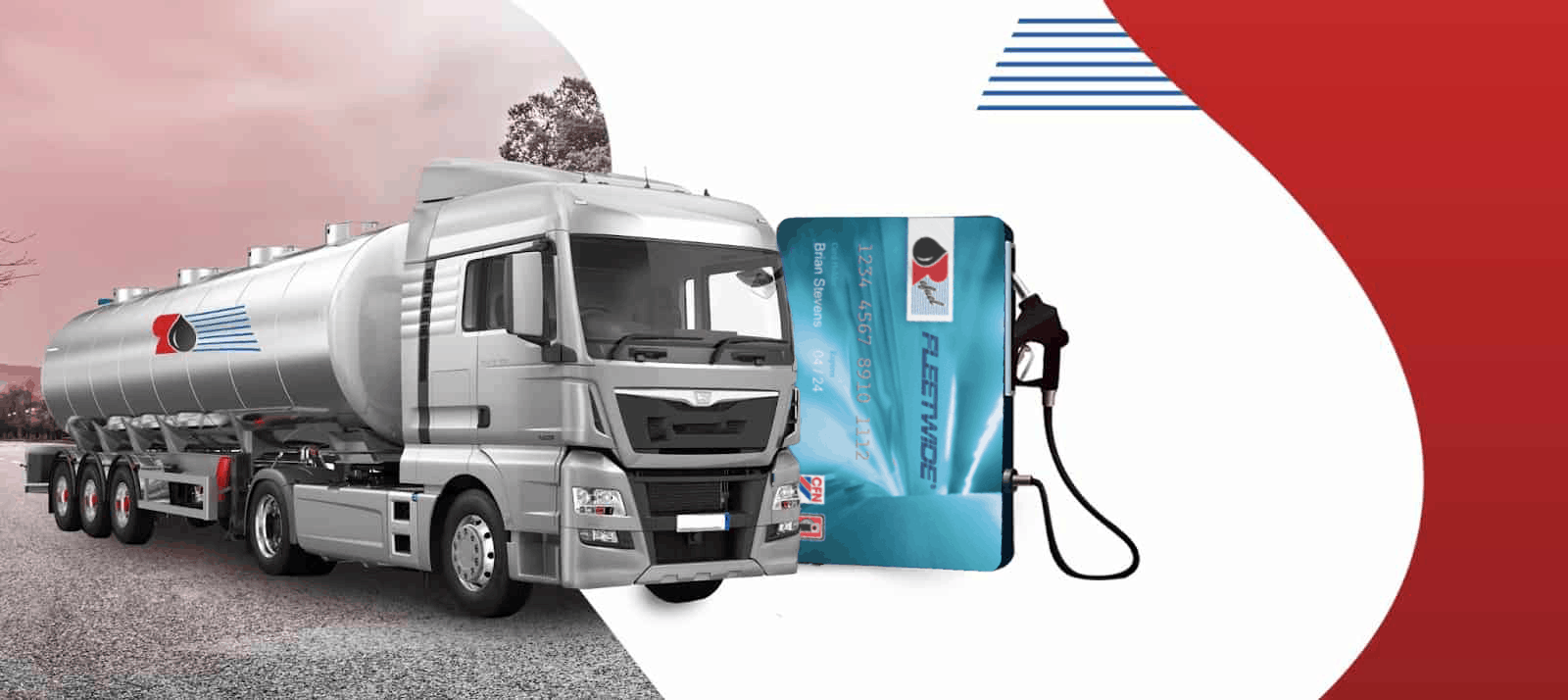Five Advantages of Using Fuel Cards for Trucking Fleets

Trucking companies often yield small profit margins, with much of the money they make going back into operating costs. One of the most direct and unavoidable costs associated with the trucking industry is the cost of the diesel fuel that powers the trucks. Since there’s no getting around fuel costs, finding ways to save on it is the next best solution. Savings in this area alone will drive a substantial improvement to profit margins, and when done right, can have a positive impact across even more areas of operation.
One powerful way to accomplish this is to implement a fuel card program.
These programs are essentially partnerships between trucking companies and fueling stations that produce benefits for both parties. A provider issues fleet fuel cards to owner-operators of trucking fleets, and drivers use these cards on fuel purchases at participating stations. The provider then receives a cut of the overall sale. Though specific rates may vary, drivers are incentivized to visit these partnering gas stations via exclusive discounts on fuel pricing.
For drivers, fuel cards are easy to use, and they operate similarly to any other card normally used to cover expenses. But behind the scenes, there is a lot more going on that is specific to the trucking industry. These programs can be exceptionally impactful to businesses’ bottom lines while making everyday activities easier for everyone involved. Read on to understand how fuel cards work and the benefits of implementing them in your own business, plus what to look for in fuel card companies and the programs they offer.
1. More Flexibility Than Credit Cards
In some ways, it may seem like using a fuel card is the same thing as using credit cards. Many business owners wonder if it is worth setting up an entirely separate card program just for fuel. While the cards themselves look similar, there are several key differences.
There is an element of control in fuel cards that cannot be applied to a regular credit card program. Purchases are generally limited to specific categories or product types, such as gas stations, car washes, or other business-specific purchases. This allows owner-operators to restrict purchases and avoid any out-of-line transactions, as well as implement spending limits.
However, fuel cards also enable flexibility to truckers and their companies in other ways that exceed traditional credit cards. For instance, they capture more detailed transaction data, such as odometer readings and driver ID details, information on the type of fuel purchased, and time and date details — all without requiring transaction fees. In contrast, a traditional credit card statement will provide the merchant’s name, the date of the purchase, and the amount, but nothing further.
2. Transparency for Trucking Companies
One of the most complex parts of fleet management in the trucking industry is the distance between those in the office and those out on the road. While most business happens at the central office, drivers are spread throughout the country on jobs. This makes it important to have transparency into what is happening on the road, and fuel cards are an excellent way to provide this. Not only can controls be put in place before purchases occur, but all the information associated post-purchase will also be readily available to the folks back in the office.
Often, these programs are set up so that a purchase cannot be made without a driver providing information that ties them to their organization. They may have to use a PIN to authorize the purchase or even show an ID inside the fuel station before the transaction goes through. Activity can also be limited to certain stations, truck stops, and gas quality based on the company’s protocol.
Once a purchase happens, the accounting team back in the office receives all the details surrounding the activity and driver. On top of the details being rich with data, they are generally provided in near real-time. They can be easily managed through online accounts for monitoring spending, reporting, and assessing expenses. As opposed to the delay and vagueness associated with credit cards Some fuel card programs will automatically track and associate fuel purchases with local regulations for quarterly reporting to the International Fuel Tax Association (IFTA).
3. Fuel Savings and Management
As fuel is an unavoidable expense, one of the main reasons for choosing fuel cards is the potential they offer for saving on the fuel itself. In addition to rebates and rewards, most programs build in a discount in fuel prices for using them, offering some cents off per gallon of fuel. The more you spend on the card, the more you save, making this a win/win for both businesses.
While the bulk of spend on a fleet card will be related to diesel fuel purchases, many businesses choose to set up the ability to make other purchases in pursuit of savings. In addition to saving money at the gas pump, fuel cards often include rebates that trucking companies can use for servicing their vehicles or paying for hotel rooms. This allows the savings on fuel to be put directly back into the business and cut back on other operating costs.
The majority of programs do not require monthly fees, transaction fees, or general card fees that you may see with other types of purchasing programs. Even when these do come into play, they are made up for by all the additional savings and fuel discounts.
4. Choosing the Best Fuel Card: A Variety of Options
As a whole, fuel cards are known to benefit truckers and trucking companies alike, but every business is different. Luckily, there is a range of options available when it comes to choosing a program. For example, large and small businesses may have different priorities, and when selecting the best fuel card for you, there are several factors to consider.
- The level of card security can vary across providers, but this may include authorizations needed to make a purchase and how the card management system handles alerts in the case of any possible breaches. A best practice here is to make sure your card works like a credit card rather than a debit card. And in the worst-case scenario, if a driver loses a card, your provider should have a protocol in place to prevent the card from being compromised.
- Accounting information is vital in all cases, but you will want to get a sense of the online platform used for fueling management. Make sure that it fits your needs and expectations of the technology. This includes the level of detail provided, the usability of the reporting, and questions like whether a mobile app is available. The availability of this data is critical, as there is not much benefit to collecting this much information if it is too difficult to access it when you need it.
- With any strong partnership, reliable customer service will be necessary. And just like evaluating any other management tool, the experience you have during the initial discovery process will be a good indicator of what the relationship will look like in the long term. On top of the business management side, you’ll also want to know what driver support looks like when problems arise while fueling up. A sure-fire way to discourage your drivers from adopting change is to make it hard for them to get the help they need when they need it.
- Consider whether you prefer a universal fleet card or one associated with a particular brand. This may depend on the location of your fleet and the flexibility your drivers require.
- Other questions to ask during this process are around the location and geography of your routes, how much fuel you purchase each month, and your fuel purchasing patterns. Providing this information can help fuel card companies provide accurate pricing and information on costs and fees for your program.
Because of all the factors that go into this decision, there is no single fleet fuel card that is best for all companies. To determine if the Retif fuel card is the best option for you, feel free to reach out to one of our sales representatives at (800) 349-9000 or contact us. We would be happy to walk you through our program.
The best fuel card for your trucking business will depend on your goals, but there is no shortage of options in the market. Both large and small trucking companies have benefited from these cards when the right questions are asked and programs are implemented to meet their business needs.
5. Convenience for Truckers
From the owner-operator perspective, there is hardly a downside at all for participating in these programs and enforcing the use of fleet cards. The same applies to the truck drivers as well, the ones actually doing the fueling. For the most part, truckers will never notice the difference between using a fuel card program and a regular credit card. Both cards essentially work the same way at the pump without adding unnecessary steps to provide security and savings. Even drivers who are used to carrying cash often prefer this easy and efficient payment method. It prevents them from having to have cash on hand and eliminates the need to keep and report paper receipts.
At the end of the day, the convenience these programs make possible is not limited to the companies paying for them. On a regular basis, drivers will benefit from convenience at the gas station and contactless payment that is inherent to using cards over cash. They will reduce time spent at the pump while increasing security and protecting against fraud and lost or stolen cards. The mobile apps provided by many programs also simplify card management, offering purchase information at their fingertips.
When a trucking company partners with a fuel card provider, they are improving fleet management and control, leveraging a robust accounting tool, and earning significant savings all at the same time. Though the savings incurred on a single tank fill-up may be a drop in the bucket, they will add up over time, especially when factoring in how those numbers compound across entire fleets. Fuel cards used in place of traditional credit cards allow truck drivers to meet their business needs quickly while providing in-depth and real-time monitoring to the in-office accounting teams.
The card specifics may vary, but once a business chooses the right one for them, they’ll quickly appreciate and rely on the transparency, convenience, and flexibility that come with them.



